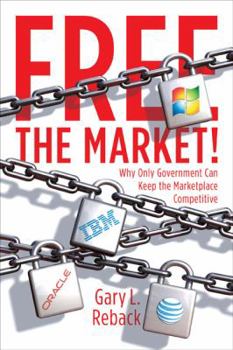Free the Market!: Why Only Government Can Keep the Marketplace Competitive
Why we need government intervention in the free market to protect competition and encourage innovation ? Starting about thirty years ago, conservatives forced an overhaul of competition policy that... This description may be from another edition of this product.
Format:Hardcover
Language:English
ISBN:1591842468
ISBN13:9781591842460
Release Date:April 2009
Publisher:Portfolio
Length:416 Pages
Weight:1.40 lbs.
Dimensions:1.6" x 6.2" x 9.0"
Age Range:18 years and up
Grade Range:Postsecondary and higher
Customer Reviews
5 ratings
A remarkable account of the business, law, and politics of competition in IT
Published by Thriftbooks.com User , 15 years ago
Gary Reback's Free the Market is a remarkable achievement. It is not a polemic as the title might suggest, but a thoughtful odyssey through many of the most important competition policy cases and issues of the past 25 years. It is extraordinarily well-written and enjoyable, in part because Reback is a practicing attorney dealing with concrete issues with real clients that are familiar to anybody that has worked in the IT sector. This behind-the-scenes account vividly recreates the complex legal, business, and political environment in which he has worked. Concrete details and personal observations enliven a very difficult area of the law, in which economy theory, empirical evidence, and legal framework are deeply intertwined. While a background in law or economics (and a familiarity with IT sector) is undoubtedly helpful, these different elements are pulled together through lucid and unpretentious writing in a way that any intelligent reader who cares about competition in today's digital economy can understand and enjoy.
An Important Book for Silicon Valley
Published by Thriftbooks.com User , 15 years ago
Free the Market! is a fascinating account that shows why Silicon Valley (and other) entrepreneurs and innovators need more than self-regulating markets to help them succeed. For the past three decades, monopolists have blocked or made life difficult for some great firms, and harmed consumers in the process by limiting their choices. There are many illuminating examples throughout the book - they include, among others, a riveting account of what happened to Netscape, and how the mega-mergers of AT & T/SBC and Verizon/MCI made all of us much poorer as a result of those mergers, literally as well as figuratively. An excellent book, very well-written and clear, with entertaining vignettes along the way!
An Important Book for Antitrust
Published by Thriftbooks.com User , 15 years ago
This book is thoughtful, well researched, and fluently written. Whether the reader agrees with his position on antitrust enforcement and Chicago School economics or not, Reback has clearly walked the walk throughout his long career as an antitrust practitioner. His viewpoint therefore deserves careful review and consideration by anyone involved in the antitrust field.
A Page-Turner
Published by Thriftbooks.com User , 15 years ago
I really LOVED this book. I picked it up as soon as it came, and couldn't put it down. I found the book fascinating both from the standpoint of the history and the policy, and it was also a very good read.
Good Background, but Overly Legalistic (for me)
Published by Thriftbooks.com User , 15 years ago
Memory told me that resale price maintenance (price-fixing) was illegal. Yet it is also clear that Sony and Samsung, for example, are forcing standard pricing on their hottest products. Reback's "Free the Market" explains what's going on. Minimum-pricing agreements keep retail profit margins higher, which in turn keeps retailers from pressuring manufacturers to lower the wholesale prices they pay, explains the 4/28/09 Wall St. Journal. Suppliers also think eliminating pricing competition can help retailers spend more promoting their products. Starting with the Reagan years, free market proponents have argued for limiting antitrust rules, trusting companies to be self-policing and markets to be self-correcting. After covering the early history of anti-trust etc. legislation, Reback relates his own initial experience defending retail price maintenance for Apple Computer - rationale was to stop "free-rider" mail-order vendors that sloughed education etc. expenses off onto retail stores. Reback et al lost the case, thanks to a 1911 Supreme Court case that had declared such practices illegal, per se (no counterarguments allowed). Unfortunately, the Supreme Court then overturned that decision in 2007, thanks to the influence of the "Chicago school" of economics and law (and failed to notify me). Reback explains, and then strongly disagrees with their decision, stating that the essence of capitalism is that free and open competition is good for the public and must be nurtured and protected by the government. Disastrous results have followed the Chicago school, beginning with mergers creating overpowering giants, and excessive patent and copyright protection. I'm not an attorney, so Reback's detailed legal accountings were a bit much for me. Nonetheless, "Free the Market" was an informative book, and undoubtedly even more so with legalistic minds. The "good news" is that efforts are underway in the Senate to circumvent the Supreme Court's ruling, and Maryland is leading the way to do so as well.





